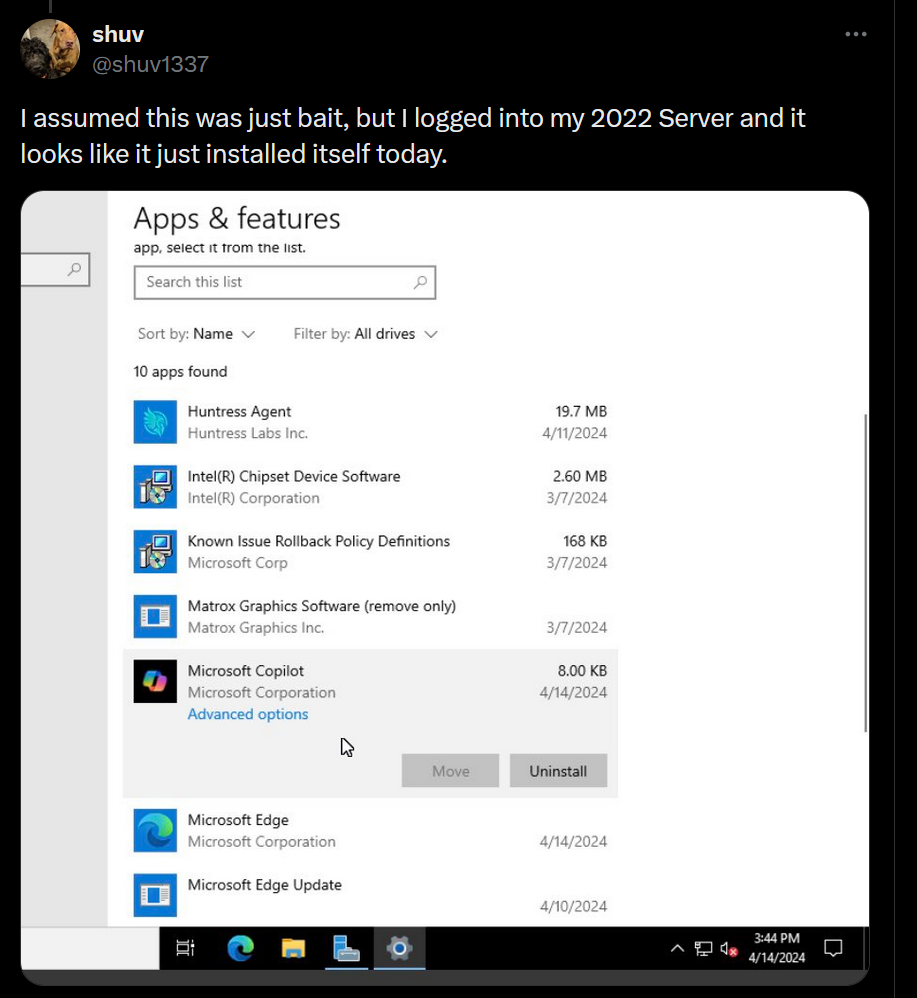Sos Sosowski (@sos@mastodon.gamedev.place)
mastodon.gamedev.placeAttached: 1 image
So, Microsoft is silently installing Copilot onto Windows Server 2022 systems and this is a disaster.
How can you push a tool that siphons data to a third party onto a security-critical system?
What privileges does it have upon install? Who thought this is a good idea? And most importantly, who needs this?
#infosec #security #openai #microsoft #windowsserver #copilot

You must log in or register to comment.
A place to discuss privacy and freedom in the digital world.
Privacy has become a very important issue in modern society, with companies and governments constantly abusing their power, more and more people are waking up to the importance of digital privacy.
In this community everyone is welcome to post links and discuss topics related to privacy.
Some Rules
- Posting a link to a website containing tracking isn’t great, if contents of the website are behind a paywall maybe copy them into the post
- Don’t promote proprietary software
- Try to keep things on topic
- If you have a question, please try searching for previous discussions, maybe it has already been answered
- Reposts are fine, but should have at least a couple of weeks in between so that the post can reach a new audience
- Be nice :)
Related communities
much thanks to @gary_host_laptop for the logo design :)
- 0 users online
- 108 users / day
- 435 users / week
- 1.32K users / month
- 4.54K users / 6 months
- 1 subscriber
- 4.63K Posts
- 117K Comments
- Modlog






I thought the Microsoft technologies designed to allow anyone to access your servers were called Exchange and Active Directory.
Exchange allows users to access data and Microsoft services and it comes with good documentation and a whole slew of controls for org admins.
Active Directory provides authentication services, and it is mostly for your internal users (so they can access org services, including Exchange), but it’s very common to allow guests and to federate under certain circumstances, so your AD talks to their AD and external guests can authenticate and use resources that have been shared with them.
It is also well-documented with tight control in the hands of administrators.
Copilot is a black box. Their terms of service are vague. Microsoft’s responsible AI website comprises of marketing speak, no details, and the standards guide on the site is mostly questions that amount to “TBD”. Administrative ability to control data sharing is non-existent, not yet developed, or minimal.
We don’t know the scope of data gathered, the retention and handling policies, or where that data/any models built from that data are going to wind up.
My read is that they’re waiting to be sued or legislated before they impose any limits on themselves.
Please explain more.
I’m not confident they are authoritative on the matter.
Don’t consider me to be, either, but I have more details in my response to them.
https://lemmy.sdf.org/comment/10635782
I read their message as a joke that AD was an easy vector for an adversary
Yeah… I realized that like an hour later, and couldn’t figure out how to respond appropriately. Then I forgot all about it because ADHD.
But yeah. I definitely got whooshed here.
In my defense, I guess I wasn’t expecting to see a joke in the thread, so … well, I didn’t see one.
Usually those are the ones all those companies and organizations are using who have their files encrypted by malware.
Correlation != Causation.
Now, on the other hand, the number of breaches has gone way up recently. Microsoft has pushed AD and Exchange into the cloud recently. And they just had several instances where keys were stolen and passwords were left in the clear for months after they were notified, as well…
Well we have no solid evidence but it’s certainly within the realm of possibility.
Yes that’s because all companies pretty much use AD and exchange is also popular (but less so now with exchange online)
Both are also extremely valuable for companies and thus attackers.
Ransomware attacks pretty much always rely on missconfiguration and/or social engineering.